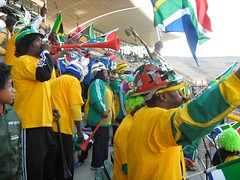
South African soccer fans during the 2010 World Cup blowing the Vuvuzela. The instrument became a feature of the games. They are manufactured in the People's Republic of China.
Originally uploaded by Pan-African News Wire File Photos
BARRY MOODY | JOHANNESBURG, SOUTH AFRICA
Jul 12 2010 11:58
Rarely can a global event have generated so much advance pessimism as the World Cup, and the sceptics are now finally having to eat their words.
In the six years after South Africa won the right to stage the
continent's first tournament, organisers endured a sea of negative
reports and plenty of domestic self doubt.
There were persistent suggestions Fifa had a "Plan B" to move the
soccer spectacular to Australia because of doubts over Africa's
capacity for such a vast logistical exercise.
Other reports said the stadiums would not be ready in time, fans and
teams would be victims of South Africa's frighteningly high rates of
violent crime, that infrastructure would be incomplete and that
transport would be a disaster.
With the exception of an embarrassing problem at Durban airport, where disorganisation prevented hundreds of irate fans landing to see the Spain vs Germany semifinal, the country defied all these concerns.
Crime, the biggest bugbear, which did have an impact in reducing
foreign visitors, has been virtually non-existent.
So it is no surprise that South Africa is now basking in a glow of
satisfaction and unprecedented self-confidence.
'Just stand in the corner and sulk'
Chief local organiser Danny Jordaan happily mocked the pessimists.
"Just stand in the corner and sulk. You are a small minority. We will
just leave you in the corner," he said.
President Jacob Zuma said the World Cup "has been a great success and will leave a lasting legacy in our country".
Jordaan believes the tournament was the most important national event since the end of apartheid in 1994. "It was a moment of special
unity," he said at the weekend.
It undoubtedly has brought people together in a country still troubled
by racial divisions, as a stream of ecstatic callers to radio stations
testified.
"I have never experienced anything like this joyful multi-racial
exuberance in my life. Even the inauguration of Nelson Mandela ... in
1994 pales into insignificance," said a letter to the Star newspaper
from reader Farouk Laher.
It has also provided South Africa with a lasting legacy of roads,
major infrastructure and especially transport to townships isolated
under apartheid, which would probably not have been built for decades
without the World Cup deadline.
Another major impact is the rebranding of Africa with a likely
significant impact on investment and tourism.
"The long term impact is very important not just for South Africa but
perhaps even more so for Africa," said Frans Cronje, deputy director
of the South African Institute for Race Relations.
"Having hundreds of millions of people focused on South Africa,
focused on the good bits, the stadiums, the football the
infrastructure; they have seen it is not just a jungle out there but
these guys have roads and highways and electricity."
Anne Fruhauf, an Africa analyst with Eurasia agreed. "The successful
management of the World Cup should boost South Africa's global brand," she said. "A tournament well delivered will also help ... the
investment case for the wider African continent."
Independent analyst Nic Borain said the demonstration of racial unity
had impressed both foreign journalists and fans. "This is an asset
that is banked for the future," he said.
South African fund managers say new capital is already flowing to
Africa on the back of the tournament.
General euphoria
Despite the general euphoria, there are still critics who say South
Africa should not have spent more than $5-billion on the tournament
when it still has an army of poor and unemployed, the world's highest
HIV caseload and myriad other problems.
Marcus Solomon, a social worker who spent a decade in the notorious
Robben Island apartheid prison told Reuters: "They are spending so
much money on one activity ... and the time is over for its use now
and all that money is wasted."
But the critics have been muted in recent weeks.
Jack Lutaaya Kato, 22, a trader in Soweto township, complained he had made no money from the World Cup but added: "As Africans, we feel pride. In Europe, people did not know about South Africa. Now they have seen us in a good light."
When the World Cup circus moves on however, Zuma will face a major and possibly dangerous challenge -- can his squabbling government maintain the momentum?
"In the World Cup there was a large consensus. Everybody cooperated. It is absent when you look at the broader government or political landscape," said analyst Ebrahim Fakir of the Electoral Institute of South Africa.
"The glow of the tournament will fall away, government and policy
people must be careful that they don't reap a bit of a whirlwind at
the end of it ... If you can build Soccer City on time, why can't you
build an RDP [public project] house on time?" said Cronje.
"We have been able to prove ourselves in an extraordinary way ... we
have done that for a month, why should it not be possible to do so on
a more permanent basis," said High Court judge and law professor
Dennis Davis. -- Reuters
Source: Mail & Guardian Online
Web Address: http://www.mg.co.za/article/2010-07-12-south-africa-confounds-afropessimists
No comments:
Post a Comment